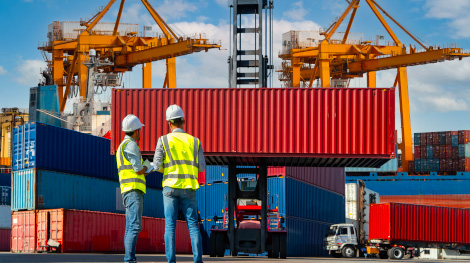When your company is new to exporting, understanding UK customs clearance and the documents associated can feel daunting.
Incorrect or missing documents can result in delays, fines and sometimes too much duty being paid.
This article covers some of the key documentation needed to get goods through UK customs. But there’s no doubting it’s a complex area. For specialist guidance, reach out to me below.
Commercial Invoice
The commercial invoice contains all the basic information related to the shipment, including but not limited to:
- Name and address of seller
- Name and address of consignee
- Date
- Invoice number
- Country of departure
- Country of destination
- Quantity
- Unit weight
- Unit value
- Number of packages
- Unit price
- Total shipment value
- Commodity code/HS code
- Incoterms
This information allows the customs officials to fully understand the shipment. They can check the goods are allowed to move between the nations and that the correct duties are being paid.
It’s a document that must be issued by the seller, serving as proof of transaction between the companies involved in the trade, which customs then have on record too.
If you are the seller, thankfully, the information should be easy to gather up and there are plenty of free commercial invoice templates which you can download online. You can find a great one from eForms here. Please note that any template taken online might not have all the content forms you need for your transaction. If not, they can be a good baseline for building your own.
For the buyer, make sure you receive this document before any monetary exchange. This document acts as proof of the transaction, including a record of the incoterms so liability can be found in the event of damage or loss on route.
An example of a commercial invoice is below:

C88 Form
This form is only for cargo movements involving the EU.
A single administrative form, or C88 form, is the primary customs form for movements between the EU and UK. It is used as proof that the goods can pass legally between the trading blocks, containing many of the key details related to the shipment for customs officials.
Unlike a commercial invoice, this form is not customisable. It is a set form, which you can download here. The details need to be compiled by the seller.
Goods Movement Reference
The GMR is only needed for road freight arrivals into the UK from the EU, which are transiting through a port which uses GVMS (Goods Vehicle Movement Service).
You get a Goods Movement Reference by registering for the GVMS online.
Once registered you’re able to generate a GMR which can be submitted to your haulier, and they can get the goods through the port.
Packing List
A packing list contains more detailed information about the cargo, describing every individual package, its weight, dimensions, and contents. It will also contain the addresses of the seller and buyer.
This gives customs officials a more detailed understanding of the cargo. They can identify and investigate individual packages for further checks, if necessary, without having to go through the whole shipment.
It basically makes the customs process much easier and quicker, which ultimately reduces your supply chain lead time and boosts efficiency.
An example of a packing list can be found below:

Bill of Lading/Airway Bill
The Bill of Lading (for sea/road freight) or Airway Bill (air freight) is issued by the transporting company as a receipt that the goods have been received and are under their stewardship.
It details the type, amount, and destination of the goods in the shipment.
They’re vital for customs because it confirms the shipper is the owner of the goods, while the carrier is in possession of them. The bill should be handed to the consignee upon receipt of the goods, to demonstrate they are now the rightful owner.
For shipments between the UK and non-EU countries, the Bill of Lading/Airway Bill should include the total value of the shipment, which customs can use for calculating any duty and VAT due. For shipments from EU nations, this information will need to be submitted to the customs agent separately.
More about the Bill of Lading can be found here. Or learn more about the airway bill here.
Dangerous Goods Declaration
Obviously, a Dangerous Goods Declaration (DGD) is only relevant if your cargo is hazardous. The form is required to certify that dangerous goods regulation has been followed and the shipment is labelled accordingly. It must be submitted by the sender.
Is your cargo dangerous? The UK government have a good resource on what constitutes hazardous goods here.
Import/Export Licence
For certain goods, a special licence is required for importing and exporting.
The requirements for acquiring a licence depend on the type of goods you’re trading. Obtaining the licence will require a financial outlay and possibly a site visit from customs officials.
The following products require a licence for international trade to or from the UK:
- Animals and animal products
- Plants and plant products
- High risk food
- Veterinary medicines
- Human medicine
- Controlled drugs
- Tissues and cells for human application
- Waste
- Products containing F gas
- Precursor chemicals
- Hazardous chemicals
- Nuclear material
- Guns, knives, swords, and other weapons
- Weapons and goods that could be used for torture or capital punishment
- If trading any of those items, investigate the licencing requirements for your goods.
IPAFFS health certificate
With the UK no longer in the EU, the TRACES system to validate imports is no longer in use. It has been replaced by the IPAFFS (Import of products, animals, food, and feed system), which is used to validate certain goods from both EU and non-EU countries. If exporting, this is not a relevant form.
The following products require prior notification via the IPAFFS:
- Live animals
- Germinal products
- Animal by-products
- High-risk food and feed not of animal origin (HRFNAO)
- Products of animal origin (POAO)
- Composite food products
- Plants and plant products
However, there are some exceptions for products from Ireland. For more information about the IPAFFS, including how to register, see the government's website here.
Remember, before collating any documentation for international shipping, you will need an EORI number. Economic Operators Registration and Identification numbers are necessary to move cargo between the UK and any country, including the EU. It is used to track customs information related to your business.
The exact documentation needed to import or export from the UK depends on your unique shipment. If you have any questions or want to check you have everything you need reach out to me below, I'm happy to help.

Alternatively, explore our detailed guide on whether your company needs a customs broker.







